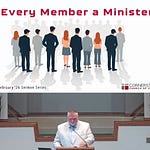Philippians 1:21–23; Luke 16:19–31; 2 Corinthians 5:6–8
Last week, we asked the question, “What happens when we die?” We saw from Hebrews 9 that death is inevitable, judgment is coming, and Christ is returning. But this raises another question: Where do we go in the meantime? Scripture shows us that death is not the end of our existence. For the faithful, it is a doorway into the presence of Christ. For the unbeliever, it is separation and regret.
I. Death Is Not the End (Philippians 1:21-23)
“For me, to live is Christ and to die is gain.”
Death brings us closer to Christ: “I long to depart and be with Christ, which is far better” (v. 23).
Without Christ, death is loss: opportunity, hope, eternal life.
The Reality of the Afterlife (Luke 16:19-31)
“The poor man died and was carried away by the angels to Abraham’s side. The rich man also died and was buried. And being in torment in Hades, he looked up…” (vv. 22–23).
A great reversal: “Now he is comforted here, while you are in agony” (v. 25).
A fixed destiny: “A great chasm has been fixed… so that those who want to pass… cannot” (v. 26).
Scripture is enough: “They have Moses and the prophets; they should listen to them” (v. 29).
To Be with the Lord (2 Corinthians 5:6-8)
“We are always confident and know that while we are at home in the body we are away from the Lord.”
“For we walk by faith, not by sight.”
“We would prefer to be away from the body and at home with the Lord.”
Jesus promised the thief, “Today you will be with me in paradise” (Luke 23:43).
As We Close
Philippians 1: “To live is Christ and to die is gain.”
Luke 16: comfort or torment — no second chances.
2 Corinthians 5: to be absent from the body is to be present with the Lord.
“Now is the acceptable time; now is the day of salvation” (2 Corinthians 6:2).











